If your cholesterol numbers are high and your doc is trying to get you to take a statin to get them back in range to reduce your risk of heart attack or stroke, you might want to consider some nutritional supplements instead.
Before we get into those supplements, here's some information on cholesterol, statins, CoQ10 and the brain.
CHOLESTEROL

What Is Cholesterol
Cholesterol is a fat-like, waxy substance that occurs naturally in every part of your body. Cholesterol is important because it helps:
Construct the semi-permeable membranes around each of the 100 trillion cells in the body
Produce estrogen, testosterone, and adrenal hormones
Make vitamin D
Prompt your metabolism to work efficiently
Support your immune system
Facilitate cell communication and memory in the brain
Repair damage that occurs within the cardiovascular system
- Stephen Sinatra. MD, undated
The Brain Needs Cholesterol - and Lots of It

Approximately 25% of the total amount of the cholesterol in humans is found in the brain, most of it present in the myelin, an insulating sheath that forms around nerves. Almost all brain cholesterol is synthesized locally. The blood-brain barrier efficiently keeps it from exchanging with the lipoprotein cholesterol circulating in the rest of the body.
"The independence of the isolated pool of cholesterol in the brain is likely to reflect a high need for constancy in the cholesterol content of membrane and myelin, a constancy that would be difficult to keep if brain cholesterol had been exchangeable with lipoprotein cholesterol. (Björkhem & Meany, 2004)
CHOLESTEROL IN THE BRAIN
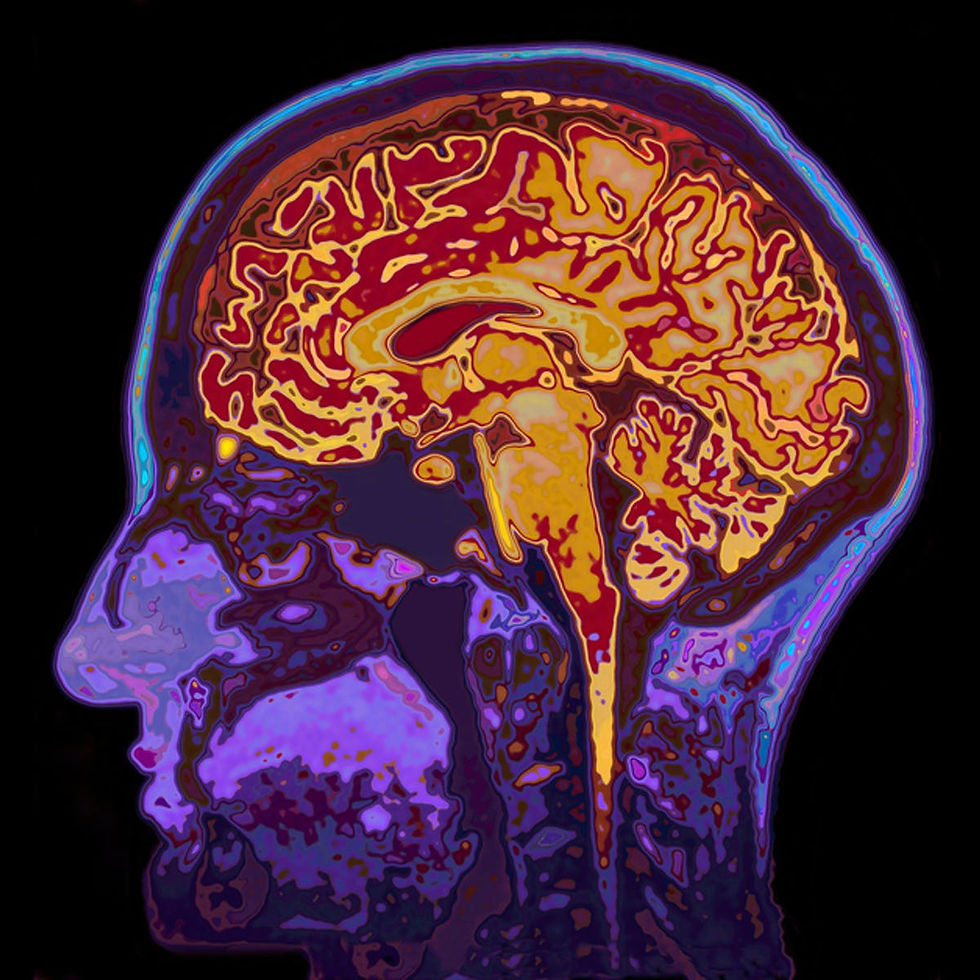
STATINS

You'll find some intense arguments about the safety and efficacy of statin drugs.
Statins cause memory loss VS Statins can help improve cognition
Prevent Alzheimer's VS Increase risk of Alzheimer's
Help avoid a heart attack VS No evidence they prevent heart disease
Worth the potential risks VS Side effects make them too risky
I've read a lot of research studies and experts' opinions while researching this article and still can't figure out who's quite got it right.
Given my life-long poor track record taking pharmaceuticals (a statin among them) and having to stop because of difficult side effects, I've become inclined to focus on preventing disease and looking for non-pharmaceutical ways to fix what ails me. Over time, I've found a Functional Medicine approach works best for me. Treating the underlying cause of a health problem makes more sense to me than focusing on medicating symptoms and trying to detect diseases early. This approach has greatly improved my quality of life.
Functional Medicine is "a systems biology–based approach that focuses on identifying and addressing the root cause of disease. Each symptom or differential diagnosis may be one of many contributing to an individual’s illness". (Institute for Functional Medicine, 2023)

So that's my bias to keep in mind as you read this article. It's also the perspective of my whole
site.

"While some of the cholesterol in our blood comes from the food we eat, most of it is produced by the liver. Statins work by reducing the amount of cholesterol made by the liver and helping the liver remove cholesterol that is already in the blood." Statins may also reduce inflammation in the artery walls that can lead to blockages damaging organs such as the heart and brain. (Million Hearts, undated)
Statins block an enzyme the liver needs to create cholesterol, causing the liver to remove cholesterol from the blood. (Mayo Clinic Staff, 2023)

A statin may help you lower your cholesterol but create other problems for you.
You're at Higher Risk for Side Effects from Statins If You:
· Take multiple medicines to lower your cholesterol
· Take medicines that interact with statins
· Are female
· Have a smaller body frame
· Are 80 or older
· Have kidney or liver disease
· Drink too much alcohol
· Have certain conditions such as hypothyroidism or neuromuscular disorders, including
amyotrophic lateral sclerosis (ALS)
- Mayo Clinic Staff, 2023
Now here's some problematic information about statins:
Statins Reduce CoQ10 in the Body

Coenzyme Q10 (CoQ10), a powerful antioxidant found in almost every cell in the body, helps convert food into energy.
Antioxidants fight particles in the body known as free radicals, which damage cell membranes, tamper with DNA and even cause cell death.
You don't want a lot of free radicals in your body because they contribute to the aging process, heart disease and cancers.
CoQ10 and other antioxidants neutralize free radicals to prevent or reduce some of the harm they cause.
"Some researchers believe that CoQ10 may help with heart-related conditions, because it can improve energy production in cells, prevent blood clot formation, and act as an antioxidant." (Icahn School of Medicine at Mount Sinai, 2023
While statins block production of bloodstream cholesterol in the liver, they also block production of CoQ10, causing other serious adverse side effects.
The body requires CoQ10 in muscle tissue and in the bloodstream. Reducing the production of CoQ10 can cause muscles to ache, become weak and inflamed - along with the problems shown in this graphic.
"In extremely severe cases -- I've seen this in very few of my patients -- statins can lead to the death of muscle cells, and a decrease in muscular CoQ10 may be one of the reasons. Massive cell death can also lead to acute kidney failure. (Ashley, 2018)
Other Medications Can Interact with Statins
Taking these drugs may increase your risk of statin side effects
· Amiodarone (Pacerone), a medicine for irregular heart rhythms
· Gemfibrozil (Lopid), another variety of cholesterol drug
· HIV treatments called protease inhibitors, such as saquinavir and ritonavir (Norvir)
· Some antibiotic and antifungal medicines, such as clarithromycin and itraconazole
(Sporanox)
· Some immunosuppressant medicines, such as cyclosporine (Sandimmune)
There are many other drugs that may interact with statins and cause adverse side effects. Some foods, like grapefruit, may also be problematic.
- Mayo Clinic Staff, 2023A

Common Statin Side Effects
· Muscle pain and damage
· Liver damage
· Increased blood sugar or type 2 diabetes
· Neurological side effects, including memory loss, confusion, dementia, Alzheimer's
What's happened to my memory?

A Possible Rare but Serious Side Effect from Statins: Rhabdomyolysis
Taking a statin in combination with certain other drugs or taking a high statin dose can lead to a serious medical condition called rhabdomyolysis or rhabdo that can be fatal or result in permanent disability. Rhabdo occurs when damaged muscle tissue releases its proteins and electrolytes into the blood. These substances can damage the heart and kidneys, causing extreme muscle pain, liver damage, kidney failure and death. (CDC, 2023)

High-Dose Statins Linked to Brain Bleeds

In 2017, well-respected neurologist and five-time New York Times bestselling author, David Perlmutter, MD, FACN, cited a 2015 meta-analysis study that found individuals taking high-dose statin medications "had more than a 50% increased risk for bleeding in their brains (intracerebral hemorrhage)".
Perlmutter said, "I’d really like for you all to take a look at the study. It might help someone you know rethink the idea that these medicines are without risk." (Perlmutter, 2017)
This is the study he's referring to: High-dose statin therapy and risk of intracerebral hemorrhage: a meta-analysis
Dr Perlmutter is internationally recognized as a leader in the field of nutritional influences on
neurological disorders.
Statins Inhibit the Liver from Making Cholesterol But May Also Keep the Brain from Making Cholesterol

A research study by Yeon-Kyun Shin, a biophysics professor in the Department of Biochemistry, Biophysics and Molecular Biology at the Iowa State University showed that "drugs that inhibit the liver from making cholesterol may also keep the brain from making cholesterol, which is vital to efficient brain function.... (emphasis added)
"If you try to lower the cholesterol by taking medicine that is attacking the machinery of cholesterol synthesis in the liver, that medicine goes to the brain too. And then it reduces the synthesis of cholesterol which is necessary in the brain," said Shin. (emphasis added)
"If you deprive cholesterol from the brain, then you directly affect the machinery that triggers the release of neurotransmitters," said Shin. "Neurotransmitters affect the data-processing and memory functions. In other words -- how smart you are and how well you remember things." (emphasis added)
"Cholesterol is one of the building blocks of cells and is made in the liver. Low-density lipoprotein (LDL) -- often referred to as bad cholesterol -- is cholesterol in the bloodstream from the liver on the way to cells in the body. High-density lipoprotein (HDL) -- so-called good cholesterol -- is cholesterol being removed from cells. Too much LDL going to cells and not enough being removed can lead to cholesterol deposits and hardening of the cells.
"If you have too much cholesterol, your internal machinery is not going to be able to take away enough cholesterol from the cells," said Shin. "Then cells harden and you can get these deposits."
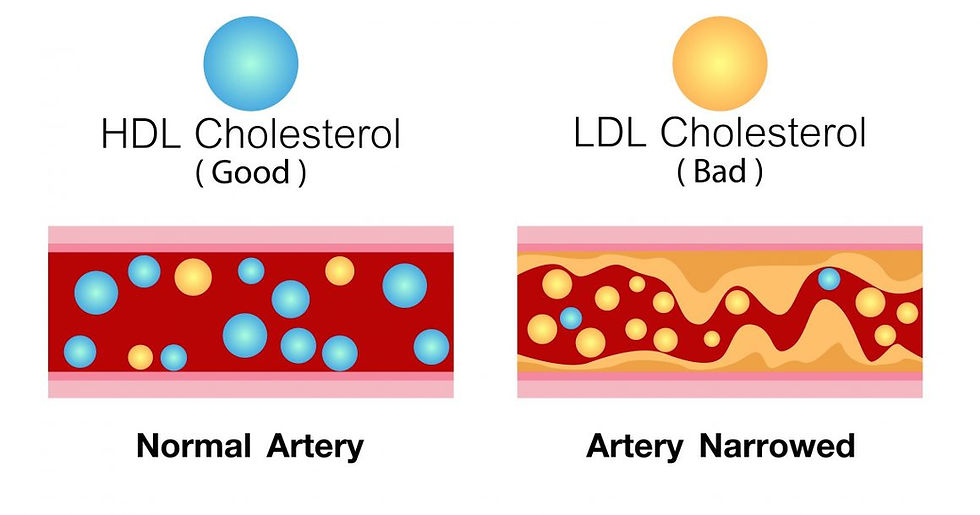
"Cholesterol-reducing statin drugs are helpful because they keep the liver from synthesizing cholesterol so less of the substance is carried to the cells. This lowers LDL cholesterol.
"It is the function of reducing the synthesis of cholesterol that Shin's study shows may also harm brain function. (emphasis added)
"In his experiments, Shin tested the activity of the neurotransmitter-release machinery from brain cells without cholesterol present and measured how well the machinery functioned. He then included cholesterol in the system and again measured the protein function. Cholesterol increased protein function by five times.
"Our study shows there is a direct link between cholesterol and the neurotransmitter release," said Shin. "And we know exactly the molecular mechanics of what happens in the cells. Cholesterol changes the shape of the protein to stimulate thinking and memory."
"While reducing the cholesterol in the brain may make you have less memory and cognitive skills, more cholesterol in the blood does not make people smarter. Because cholesterol in the blood cannot get across the blood brain barrier, there is no connection to the amount of cholesterol a person eats and brain function. (emphasis added)
Shin says that taking cholesterol-lower statins can be very healthful for many people and they should follow their doctor's advice to take the medication. (Iowa State University, 2009)

I get that having too much cholesterol in your bloodstream is dangerous. It's the finding that statins may also lower the amount of cholesterol in the brain that I find scary.

Cholesterol has been demonized. For decades, we’ve been hearing about “bad cholesterol” and how it’s related to heart disease.
The medical community’s directive to lower cholesterol has been so strong that more than 1 in 4 American adults over the age of 40 take cholesterol-lowering statins. One of the most commonly prescribed drugs in America, statins are a $31 billion business. It’s as if our nation has become obsessed with pushing levels down in an effort to protect heart health. But they’ve got it all wrong.
“Cholesterol is a poor predictor for heart disease,” says Dr. Jonny Bowden, a board-certified nutritionist also known as the Nutrition Myth Buster and co-author of The Great Cholesterol Myth: Why Lowering Your Cholesterol Won't Prevent Heart Disease-and the Statin-Free Plan That Will with Stephen Sinatra, MD.
"What traditional doctors don’t tell you is that low levels of cholesterol can have negative effects on the brain. “Your brain without cholesterol? You’re dead,” says Dr. Bowden. “It’s one of the most important compounds in the body, and it’s involved in memory and thinking and much more....
"Why is cholesterol so important? Cholesterol in the brain is involved in the communication process for neurotransmitters, such as dopamine and serotonin. It makes up the majority of myelin, the white fatty sheath that provides a protective coating on neurons to increase the brain’s processing speed. And they play a role in the development of “lipid rafts,” membranes that are involved in brain cell signaling." (emphasis added)

"Bottom line? Approximately 60% of the solid weight of the brain is fat, so you need healthy levels of cholesterol for optimal function." (emphasis added) (Amen, 2020)
Too Little Cholesterol Is Very Bad For the Brain

"Cholesterol that is too low is bad for the brain. What’s considered normal? Normal total cholesterol levels are 135-200 mg/dL. However, be aware that several studies show that lowering total cholesterol levels below 160 mg/dL can increase the risk of depression, suicide, and homicide, so 160-200 mg/dL is optimal. Don’t go too low.
"Surprisingly, if you have cholesterol on the higher side of the healthy range later in life it could improve your cognitive performance, according to research in Psychosomatic Medicine. In fact, findings in the journal Neurology show that having higher levels of total cholesterol later in life decreases your risk of dementia." (emphasis added) (Amen, 2020)

So, in light of what you now know about cholesterol, if you do need to lower your numbers, one of the things you might want to know is whether supplements used in lieu of statins to lower blood cholesterol also lower the amount of cholesterol in the brain.
More on that below.
DR SINATRA'S TAKE ON CHOLESTEROL AND HEART DISEASE
Stephen Sinatra, MD, practiced medicine in Connecticut for decades and was the founder of the New England Heart Center. He was known as one of the top integrative cardiologists in the country, combining conventional medical treatment with complimentary nutritional, anti-aging and psychological therapies.
Sinatra was also Chief of Cardiology, Director of Medical Education, Director of Echocardiography, Cardiac Rehabilitation and Director of the Weight Reduction Program at Manchester Memorial Hospital in Connecticut. He was a fellow of the American College of Cardiology and a member of the American College of Nutrition. He was the author of numerous books, including Reversing Heart Disease Now, The Great Cholesterol Myth, The Coenzyme Q10 Phenomenon and the Sinatra Solution: Metabolic Cardiology.
When I searched for his writings online as I was writing this article, I was frequently warned that I was about to enter a 'malicious' site. Apparently, the powers that be are 'protecting' us from health information that doesn't adhere to the approved beliefs.
I assure you Dr Sinatra's articles and books are very helpful, not malicious.
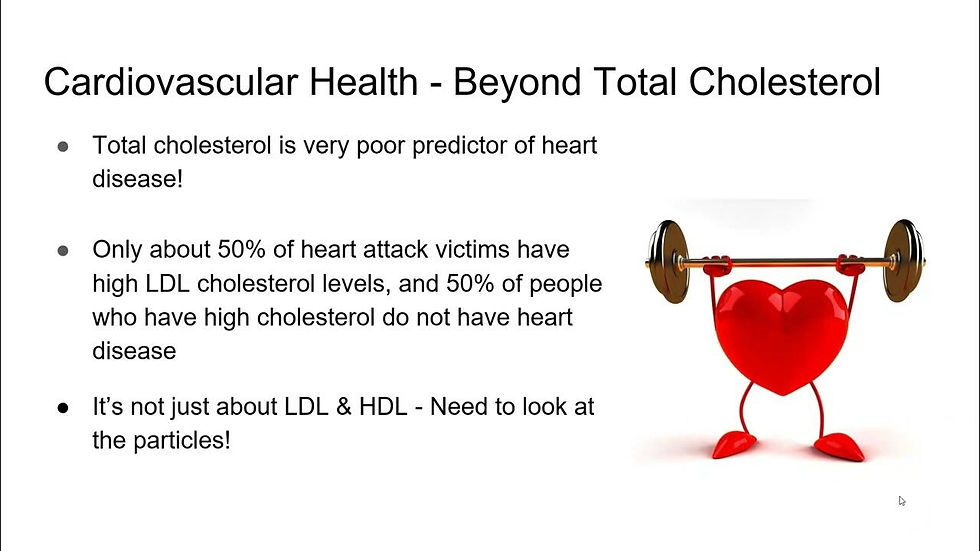
These Are Dr Sinatra's Recommendations for Which Tests Best Measure Blood Cholesterol Levels
What are Healthy Cholesterol Levels? What is LDL Cholesterol: Why “Low” Isn’t Always Better
"Many doctors still subscribe to the myth that LDL cholesterol is “bad” and that lowering it with statin drugs will improve heart health.But driving LDL cholesterol levels too low can hurt your immune system, brain function, and overall health.
"What is the LDL cholesterol normal range? The LDL cholesterol normal range is 80–130 mg/dL. But LDL cholesterol can be large and buoyant or small and dense, so it’s important to not just look at the overall LDL level—but to test the LDL cholesterol fractions.
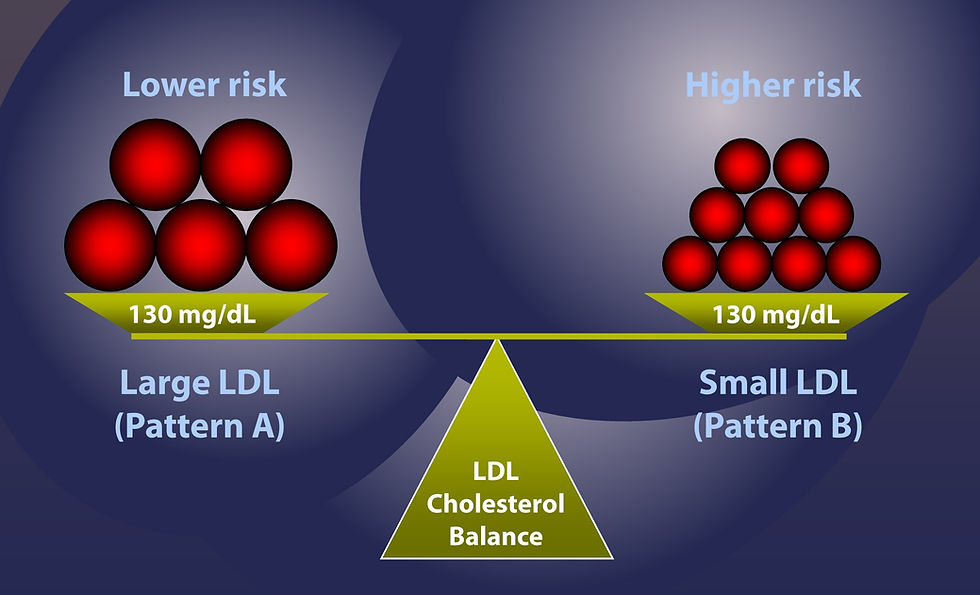
"There are two main types of LDL cholesterol, LDL-B and LDL-A:
LDL-B is the harmful form of LDL cholesterol. It’s made up of small, dense particles that can easily enter compromised arterial walls and cause inflammation. So, you want to treat it more aggressively.
LDL-A cholesterol is the more harmless form of LDL cholesterol. These are large “fluffy” LDL particles that are benign unless they’re oxidized.
"The oxidation of LDL cholesterol is considered a pivotal step in the development of heart disease because oxidized LDL can penetrate the endothelial cells lining the arteries, which contributes to—and accelerates—the inflammatory process. Over time, increased inflammation leads to the formation of arterial plaque buildup (atherosclerosis)."
The Worst Type of LDL Cholesterol Is Lp(a)

"There’s another form of LDL cholesterol that many doctors don’t measure, but should—lipoprotein(a), or Lp(a) for short. This highly inflammatory cholesterol particle is the most dangerous of the blood lipids.
"If your body is healthy, Lp(a) isn’t usually problematic, and can be beneficial since it helps to repair damaged blood vessels. But if your arteries need substantial repair, Lp(a) can build up, inflaming the blood and making it sticky and likely to clot.
"What is the Lp(a) optimal range? The Lp(a) optimal range is <30 mg/dL. If you have high levels of Lp(a), I recommend taking fish or squid oil (1 or 2 g daily), nattokinase (50 mg twice daily) or lumbrokinase (20 mg once or twice daily), and regular (not non-flush) niacin (up to 2 g daily)."
What Are the Best Blood Tests for Cholesterol?
"How is cholesterol tested? If you really want to find out the risk your cholesterol levels pose, you can’t rely on a traditional lipid panel blood test to do the job. Such cholesterol tests simply measure total LDL, HDL, and triglycerides.
"These lipid panel blood tests are what most doctors will order, but they’re quite outdated. They won’t tell you about your HDL and LDL fractions (that is, whether you have predominantly small dense cholesterol particles, or large buoyant ones). That’s why it’s imperative that you talk to your doctor about having one of these more specific blood tests for cholesterol:
NMR LipoProfile Test (developed by LabCorp)
Lipoprotein Particle Profile (LPP) Test (developed by SpectraCell)
Cardio IQ Report (offered through Quest Diagnostics)
The VAP Test (from LabCorp)"
What Are “Good” Cholesterol Numbers?
"Once you’ve had your cholesterol levels checked by one of these newer generation lipid panel blood tests, refer to these recommendations for healthy cholesterol levels:
Total cholesterol: 180–240 mg/dL
Total HDL cholesterol: 40–65 mg/dL for women; 35–65 mg/dL for men. (Remember that HDL levels much higher than 65 mg/dL may be dysfunctional.)
HDL cholesterol subtypes: Greater than 25 mg/dL for HDL2; greater than 15 mg/dL for HDL3
Total LDL cholesterol: 80–130 mg/dL
Lp(a): <30 mg/dL
Triglycerides: 50–100 mg/dL
Triglycerides subtype VLDL3: less than 10 mg/dL
"In addition to the recommended healthy cholesterol level ranges above, your doctor can review your test results to see if your LDL cholesterol is mostly made up of large, fluffy particles that are not dangerous, or small, dense particles (known as “LDL-pattern-B”) that are dangerous."
One Cholesterol Ratio You MUST Know

"Ideally you want no more than a 2:1 ratio of triglycerides to HDL cholesterol. So, if your triglycerides are 100 mg/dl, your HDL cholesterol should be 50 mg/dl. Anything under 3:5 is considered suitable, but I don't like to see a blood lipids ratio that's over 5:1." (Sinatra, undated)
"When it comes to heart health, cholesterol isn’t the villain. Every system and cell in your body needs cholesterol to function properly. In fact, driving your cholesterol numbers too low with statin medications can hurt your brain, immune system, metabolism, and more.
"Yet, that doesn’t mean you can completely ignore your cholesterol. You want to make sure your doctor is performing the right cholesterol tests and is watching the right ratios—ones that go far beyond your HDL-LDL ratio."
- Sinatra, 2023
You can read the entire article here: What are Healthy Cholesterol Levels?

NUTRITIONAL SUPPLEMENTS THAT LOWER CHOLESTEROL

Your doctor can't force you to take a statin.
These three supplements are known to lower cholesterol:
Red Yeast Rice
Bergamot
Berberine
They also provide additional health benefits.
RED YEAST RICE
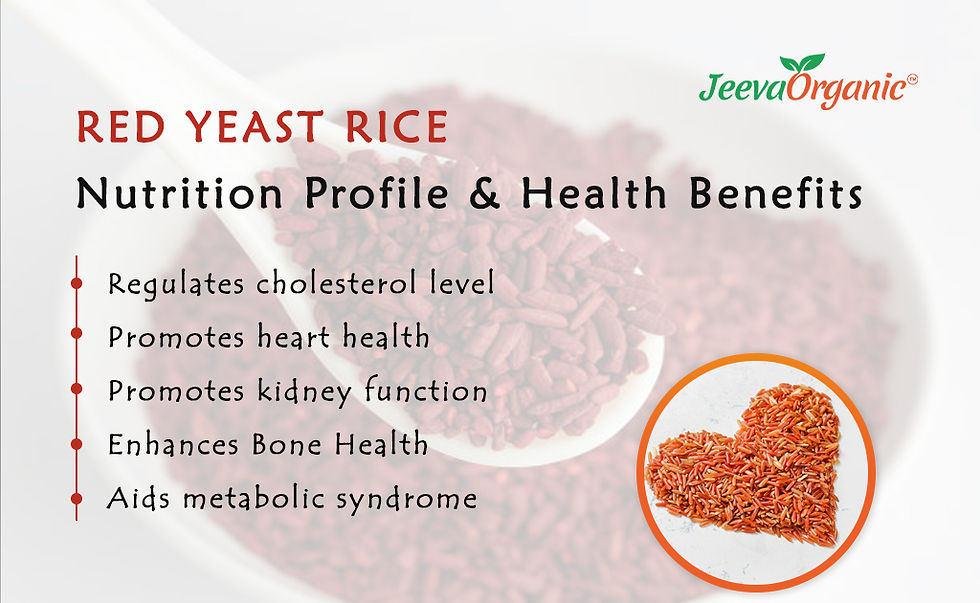
Red yeast rice is the product of rice fermented with a type of microscopic yeast called Monascus purpureus.
The powdered yeast-rice mixture is a dietary staple in Asia and has long been used in China and other Asian countries as a traditional medicine. It's also used as a food coloring, additive and preservative.
Red yeast rice contains ten different chemicals known as monacolins, which affect cholesterol levels. Monacolin K, the same ingredient as in the drug lovastatin (Altoprev), is the most abundant monacolin in red yeast rice so many people choose to take red yeast rice in lieu of a statin. (Mayo Clinic Staff, 2023A)
RYR also contains sterols, isoflavones and monounsaturated fatty acids, AKA healthy fats. (Mayo Clinic Staff, 2023B)
Research has shown that red yeast rice containing considerable amounts of monacolin K is good for hyperlipidemia (high cholesterol). It can lower total blood cholesterol level, low-density lipoprotein (LDL, or "bad") cholesterol and triglyceride levels.
The supplement is generally considered safe but might produce the same potential side effects as prescription lovastatin, including liver damage, muscle disorders (myopathy), heartburn, gas, headaches & dizziness.
Neither lovastatin nor red yeast rice should be taken if you're pregnant, trying to become pregnant or breast-feeding, have kidney or liver disease. (Mayo Clinic Staff, 2023B)
Possible interactions for both lovastatin and red yeast rice include:
Alcohol. Drinking alcohol could increase the risk of liver damage.
Cyclosporine (Neoral, Sandimmune). Taking this immunosuppressive drug might increase the risk of myopathy.
Cytochrome P450 3A4 (CYP3A4) inhibitors. Taking drugs, such as erythromycin, that inhibit this enzyme, could increase the risk of harmful side effects.
Grapefruit. Drinking grapefruit juice might increase the risk of harmful side effects.
Gemfibrozil (Lopid). Taking this cholesterol drug might increase the risk of myopathy.
Hepatotoxic drugs, herbs and supplements. Monacolin could increase the risk of liver damage.
Niacin. A high-dose of niacin might increase the risk of myopathy.
St. John's wort. Taking this supplement might reduce the effectiveness of red yeast rice.
Another statin. Taking red yeast rice with other statins might increase the risk of harmful side effects.
- Mayo Clinic Staff, 2023A
Studies have shown that certain RYR supplements can significantly lower levels of total cholesterol and specifically LDL, or "bad" cholesterol. "One showed that taking 2.4 grams per day reduced LDL levels by 22% and total cholesterol by 16% in 12 weeks. Another study showed that taking 1.2 grams per day lowered LDL levels by 26% in just eight weeks." (Mayo Clinic Staff, 2023B)
Not all red yeast rice supplements contain adequate levels of Monacolin K so, if you decide to take a RYR, be sure it's a high quality one such as CHOLEAST made by Thorne.
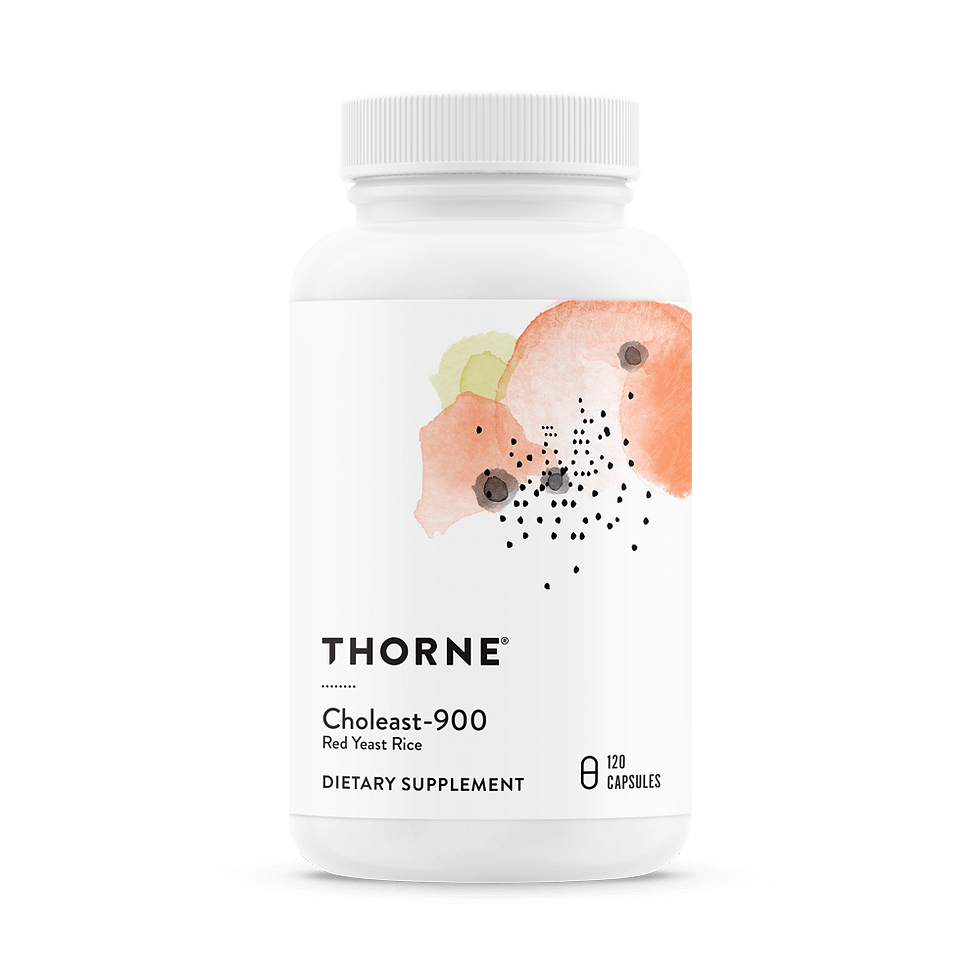
One capsule (the recommended daily dose) contains 900 mg of Red Yeast Rice (Monascus purpureus).
Thorne products are the supplements of choice used by health professionals, major sports teams, professional athletes and US Olympic teams.
My Experience Taking Thorne Red Yeast Rice:
All seven of my cholesterol levels went down after taking one 900 mg capsule of Thorne CHOLEAST daily for a few months without changing my diet at all.
* Direct LDL level went down 23 points.
* Total Cholesterol went down 29 points.
* Calculated LDL went down 19 points.
* My HDL cholesterol went down 7 points, from 87 mg/dL to 80 mg/dL. Since HDL is considered 'good' cholesterol, I'm not pleased it went down too.
Before that, after a few weeks on Crestor® (Rosuvastatin), I felt like my foot and ankle were caught in a bear trap. The sensation was painful, frightening, interfered with sleep and started moving up my leg until I stopped taking the statin.
I've had no observable side effects from taking Thorne CHOLEAST (Red Yeast Rice). It's a high quality brand.
Overall, I'm happy to be taking Choleast!

Note:
Although I didn’t find a specific answer to whether red yeast rice affects the cholesterol level in the brain, presumably it does at least to some extent since it contains the identical ingredient as a statin drug.
Please let me know if you come across the answer to this question.
CITRUS BERGAMOT

Citrus bergamia Risso et Poiteau (Citrus Bergamot) is a type of citrus native to Italy. Essential oils from the peel and extract from the juice are used to make medicine. Bergamot oil has several active chemicals and is also commonly used in aromatherapy.
A large 2011 research trial on citrus bergamot conducted by a group of pharmacobiologists in Italy found it reduced triglycerides while boosting “good” HDL cholesterol. The triglyceride to HDL ratio is the most important ratio to watch when it comes to heart health.
In another study, a patented Italian bergamot extract called Bergamonte® significantly improved cholesterol ratios in as little as 30 days. In this study of 237 men and women, the researchers divided the group into thirds. One group received 500 mg of Bergamonte daily, another third received 1,000 mg of Bergamonte and the last third received a placebo for 30 days.
At the end of the double-blinded, placebo-controlled study, the Bergamonte groups had significant improvements compared to the group who took the placebo. The Bergamonte subjects experienced reductions in total cholesterol (22% reduction) as well as LDL cholesterol (24% reduction) — and more importantly, reduced triglycerides (30% decrease) and raised HDL cholesterol (22% increase). Impressive! Plus, ithe Bergamonte also helped reduce blood glucose levels. (Sinatra, undated)
How Does Citrus Bergamot Work?
"Citrus bergamot works by inhibiting the HMG-CoA enzyme which helps to reduce LDL cholesterol in the bloodstream. Citrus bergamot also enhances fecal excretion of cholesterol. Plus, the antioxidants in this powerful extract support healthy blood vessels by supporting the endothelial lining of the blood vessels.
"Citrus bergamot has also shown great promise in antiaging medicine for its blood sugar supporting abilities. In fact, citrus bergamot, along with benfotiamine, Pycnogenol, and chromium may be the perfect combination for maintaining healthy blood sugar levels.
"I’m also following some recent case studies that are suggesting citrus bergamot may have a favorable impact on maintaining a healthy body weight—but that research is still in progress." (Sinatra, undated)
After the good results from taking Red Yeast Rice, my cardiologist wanted my cholesterol to be even lower so I started taking a Bergamot supplement too.

I’m now also taking a supplement called Naomi Italian Citrus Bergamot and inhaling some organic bergamot oil every day.
This high quality neutraceutical contains:
* 500 mg Bergamot Polyphenolic Extract
* 150 mg Resveratrol Complex Blend (wild drafted Japanese knotweed, organic French whole grapes and muscadine grape skin and seed)
* 100 mg Olive Leaf Extract
I take one capsule at breakfast and a second capsule in the evening.
You can read more about the supplement here.
Does Bergamot Cross the Blood-Brain Barrier?
An article about the neuroprotective effect of bergamot for Parkinson's patients says the answer is yes.
The article's authors point out that "several studies have suggested that Citrus flavonoids can prevent neurodegeneration, as well as other age-related conditions, and promote brain functions. Evidence that the most representative flavonoids of Citrus fruit, including hesperidin, hesperetin and naringenin, can cross the brain-blood barrier reinforces this assumption." (Ferlazzo et al, 2020)
What I didn't find was a claim that bergamot would reduce the cholesterol produced in the brain.
BERBERINE
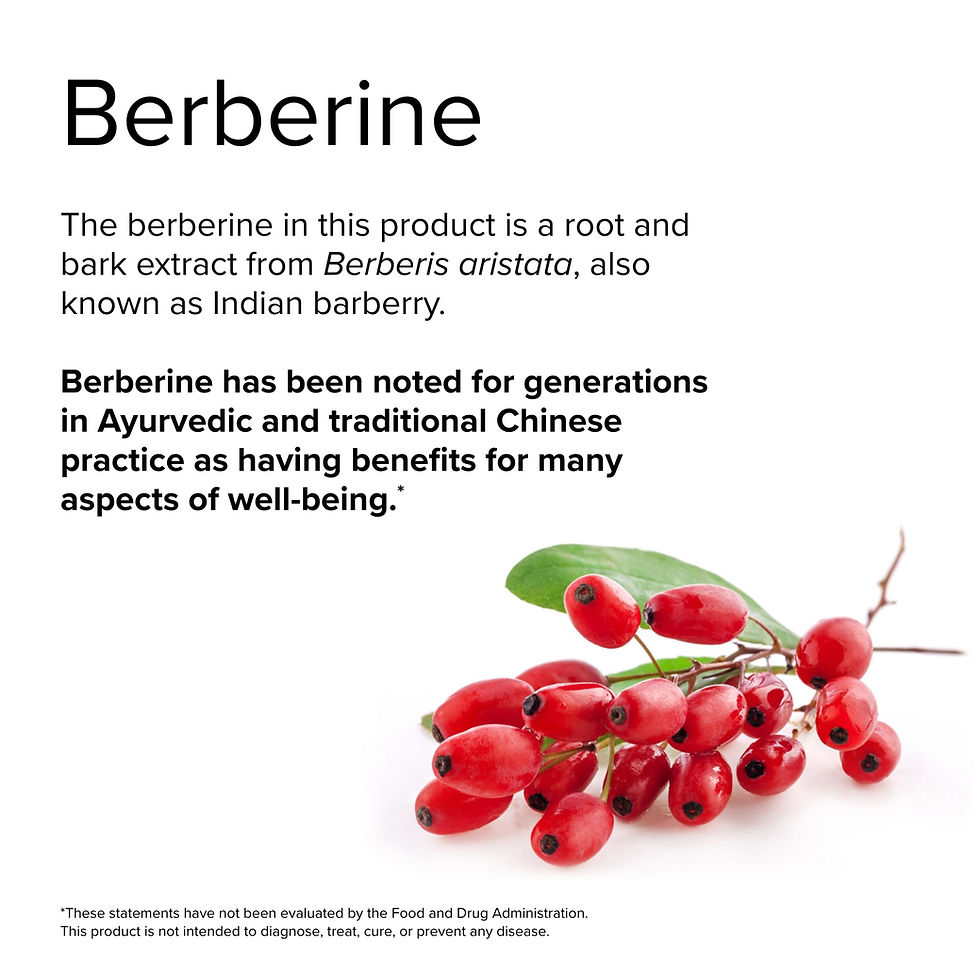
"Taking berberine supplements regularly appears to lower total cholesterol, “bad” cholesterol, and triglycerides in people with high cholesterol. It works differently from today’s standard cholesterol medications, so it may help treat people who are resistant to other cholesterol-lowering drugs."
(WebMD, 2022)
This information on berberine is from Frank Lipman, MD - a noted Functional Medicine doctor and reliable source of health advice:
"In traditional medicines, berberis species have been used to treat an enormous range of conditions, including eye, mouth and ear infections; skin irritations; wound healing; fever; microbial pathogens; digestive and respiratory diseases to name a few. Today, berberine gets high marks for its natural pharmacological properties, including its health-supportive effects on the immune system, metabolism, heart and gut health, blood and kidneys as well as for its antioxidant, antibacterial, antifungal and anti-inflammatory powers."
How Does Berberine Work?
"While berberine offers significant effects across a wide range of the body’s systems – including positive antioxidant and anti-inflammatory effects, and supporting a healthy gut microbiome – among its most exciting properties is its ability to stimulate activity inside the cells, in particular, the enzyme adenosine monophosphate-activated protein kinase or ‘AMPK.’ What makes AMPK so important is that it regulates metabolism, especially how energy is produced and used. When AMPK activity is stimulated, it boosts fat-burning, glucose uptake and energy production and may provide disease-prevention benefits similar to those that diet, exercise and healthy weight management yield. Berberine is one of the few compounds that can flip that all-important AMPK switch – so, it’s a great one to be able to tap into naturally.(Lipman, 2022)
You can read Lipman's article here: 11 Life Changing Effects of Berberine
Berberine Questions Answered by Dr Julian Whitaker
Dr Julian Whitaker is an Integrative Medicine expert, Founder and Medical Director of Whitaker Wellness Integrative Medicine and author of 13 best-selling books, including Reversing Heart Disease and Reversing Diabetes. These are his answers to some of the questions about berberine he's received:
How Does Berberine Work?
"Berberine is a potent antioxidant and anti-inflammatory with positive effects on the gut microbiota. However, its main mechanism is increasing AMP-activated protein kinase (AMPK).
"When energy runs low, AMPK signals the cells to generate more energy and conserve energy use. One way it does this is by stimulating the activity of glucose transporters that move blood sugar into the cells. It also curbs the production of excess glucose in the liver. As a result, berberine reduces blood sugar and improves insulin sensitivity, making it a popular supplement for diabetes and prediabetes.
"But there's more. Berberine lowers triglycerides, cholesterol, and blood pressure—aspects of metabolic syndrome that increase the risk of both diabetes and heart disease. It also helps with fatty liver disease and digestive disorders, and may contribute to weight loss. Plus, early research suggests it has a future in the treatment of cancer, Alzheimer’s, and other neurodegenerative diseases."
Is Berberine Safe to Take Long Term? "Always talk to your doctor, but berberine has an excellent safety profile when taken as recommended. It can cause gastrointestinal upset and constipation, which is usually mild, but is generally well tolerated. Like other botanical-based supplements, it should not be taken by children or women who are pregnant or nursing. As for long-term use, the clinical trials on berberine lasted from several weeks to two years. This may seem short, but phase 1 and phase 2 drug trials are of similar duration. On the other hand, many people have taken berberine for years with no reported problems. Plus, the well-documented therapeutic use of berberine-rich plants in Ayurvedic and traditional Chinese medicine provides an additional indication of long-term safety."
- Whitaker, 2023
You can read Whitaker's whole article here: Your Top Berberine Questions Answered

Drugs that interact with berberine
"Berberine is known to be a weak inhibitor of several cytochrome 450 (CYP450) enzymes (such as 2D6, 3A4, and 2C9). These enzymes are found in the liver and may lead to drug interactions with other prescription or OTC medicines or supplements. Inhibition of liver enzymes may increase levels of medicine in your bloodstream and cause side effects, some of which may be serious.
"Berberine may have side effects with medicines used to treat diabetes, heart disease, high cholesterol or high blood pressure, blood thinners like warfarin or medicines that cause drowsiness or sedation.
"Caution is warranted with coadministration of potentially toxic medicines such as cyclosporine."(Drugs.com, 2023)
Potential Health Risks of Berberine
Berberine supplements can have occasional side effects, including:
"Digestive complications. One study done with berberine found that it can lead to digestion problems—such as constipation, diarrhea, and flatulence—in some people. However, these symptoms typically clear up within four weeks. "
Low blood pressure. Berberine’s blood pressure lowering effects are helpful if you have high blood pressure. For some people, this effect could cause blood pressure to drop too low, which can be dangerous." (WebMD, 2022)
My Experience with Berberine
I used to take a berberine supplement (Goldenseal) but stopped about eight years ago. Don't recall why I stopped.
Although Lipman recommends 500mg of berberine taken 3x/day, a few months ago I started taking 200 mg of Thorne Berberine 1X/day to see if I still tolerated it well. After about a week, I gut a small cut on my leg and noticed it didn't want to stop bleeding and took a long time to heal so I stopped the berberine. A little research and I learned that berberine has a slight anticoagulant effect that was combining with the Eliquis I'd started on 18 months ago because my cardiologist believes I have AFib - though it's never shown up on any heart measurement. I respect and like him a lot so am not willing to dismiss his hunch.
"Berberine can also lower blood pressure and blood sugar and slow blood clotting. If you take blood thinners, anti-diabetes, or blood pressure medication, berberine might make these effects too strong.
Berberine can also interact with sedatives, phenobarbital, cyclosporine, and other medications. It can strengthen some medications and cause serious side effects."

I'm hoping my cardiologist and I can come to an agreement so I can start on a berberine supplement. This is the one I want to take: Naomi Berberine 500 mg
Does Berberine Lower Brain Cholesterol?
While I didn’t come across a definitive answer to this question, since various research studies have demonstrated that berberine plays a neuroprotective role in the different neurological disorders, including cerebral ischemic disorders, multiple sclerosis and various neurodegenerative and neuropsychiatric disorders, I’d guess that it is beneficial, rather than harmful to the brain.
(Zhiyou, C. et al, 2016)
Dr Sinatra's Advice on Non-pharmaceutical Ways to Regulate Cholesterol Levels
Dr Sinatra answered the most common lifestyle questions about cholesterol in this article:

Will Eggs Raise Your Cholesterol?
"If you avoid eggs because of their cholesterol content, you’re not alone. Many people still carry the misconception that the cholesterol in egg yolks will negatively impact their cholesterol. Yet, the truth is eggs are a heart-healthy food choice.
"Eggs are filled with high-quality protein, omega-3 fatty acids, vitamins, and minerals. Plus, egg yolks contain choline which is important for brain health.
"Many studies over the years have found that egg consumption doesn’t impact heart risk factors. Plus, one study suggests that eating up to an egg a day may even decrease cardiovascular risk factors, compared to egg abstainers.
"How many eggs should you eat? I recommend eating up to 4-6 eggs per week—choosing organic, cage-free eggs when possible."

Does Oatmeal Lower Your Cholesterol?
"If you’ve noticed a heart on your oatmeal package and wondered if it can improve your cholesterol, yes it can. Oats contain soluble fiber which helps to reduce LDL cholesterol. Plus, it contains heart-healthy omega-3s and beta glucans that support healthy cholesterol and immunity."
"For your morning oatmeal, choose steel-cut oats that are minimally processed and contain more fiber than processed oats."
Are Bananas Good for Cholesterol?

"Many people wonder if bananas are good for cholesterol, and the answer is maybe. Like oatmeal, bananas contain fiber—so theoretically they may support healthy cholesterol levels.
"But the real heart-health benefits of bananas come from its potassium content. Potassium enables your blood vessels to contract and relax as they should, which helps you maintain healthy blood pressure levels."
Does Stress Cause High Cholesterol?

"We often focus on the connection between blood pressure and stress, but did you know that stress can also affect your cholesterol?
"In a study released in 2017, researchers looked at the effect of psychological stress on blood lipid levels. What they found is that the workers with the highest levels of stress had higher levels of LDL cholesterol and triglycerides and lower levels of helpful HDL cholesterol.
"One explanation for this correlation is that when we’re under stress our bodies release cholesterol which may lead to increased cholesterol levels. Plus, stress can often lead to coping mechanisms that increase cholesterol, such as making poor food choices."
Does Drinking Water Lower Cholesterol?

"Drinking plenty of water is important for maintaining healthy blood pressure, but can it also help your cholesterol?
"Some people have suggested that hydration affects cholesterol because when you’re dehydrated it decreases blood volume. So, cholesterol sticks to the arterial walls rather than moving through your bloodstream as it should. While this is an interesting hypothesis, I haven’t seen solid science to back it up.
"Yet, regardless of whether drinking water directly impacts cholesterol, staying hydrated is important to your overall health. It impacts blood pressure, aids digestion, and enables your entire body to function as it should. So, for your overall health you want to drink about eight 8-ounce glasses of water daily."
- Sinatra, undated
You can read the entire article here: Cholesterol—What Affects It and What Doesn’t?

Dr Sinatra's Advice on How to Reduce Chronic Inflammation in Your Body
"I've long said cholesterol isn’t the real culprit when it comes to heart health, inflammation is.
Cholesterol is critical to every cell and system in your body—especially your immune system, metabolism, and brain.
" ... To keep your cholesterol levels in the healthy range and maintain healthy levels of inflammation, you want to follow these seven tips."
1. Eat an Anti-Inflammatory Diet

"Many people think the best way to lower their cholesterol levels is to avoid cholesterol-laden foods like eggs and shrimp. But the truth is, there are worse enemies than cholesterol--like inflammation.
"Instead, I recommend adopting the anti-inflammatory Pan-Asian Modified Mediterranean (PAMM) diet, which combines the best foods from the traditional Japanese and Mediterranean cultures, both known for their health and longevity. "With the PAMM diet, you can eat moderate amounts of saturated fats from eggs, avocado, and animal protein. Plus, you want to limit (or better yet eliminate) sugar, white flours, and other simple carbohydrates that can lead to inflammation. Instead, fill your diet with vegetables, legumes, fresh fruits, lean proteins, cold-water fish such as wild caught salmon, and olive oil. "Olive oil—in my opinion—is the secret sauce of the Mediterranean diet. Those that live in the Mediterranean basin and consume extra virgin olive oil on a daily basis are second only to the Okinawans in Japan (by just a few months) when it comes to worldwide longevity. The science is relatively simple. Olive oil is rich in polyphenols that support healthy cholesterol dynamics and reduce proinflammatory gene expression. "Eating the PAMM way is anti-inflammatory because it contributes to a healthy insulin response, helps minimize harmful free radicals, and gives you lots of fiber to quickly move waste and food through your digestive tract. This is the best way to maintain both healthy cholesterol levels and heart health."
2. Choose Foods Rich in Phytosterols

"Phytosterols, which are plant-derived compounds, help to naturally lower total and LDL cholesterol levels. While our ancestors’ diets were abundant in phytosterols, the typical Western diet has 1/10th the phytosterols of our ancestors’ diets.1 Consuming more phytosterols can help to lower high cholesterol levels.
"You can find phytosterols in mostly all plant foods, but you will find the highest concentration in plant oils, as well as nuts and legumes."
3. Exercise for 30 Minutes a Day

"Exercise plays a major role in lowering cholesterol. As your metabolism rises during exercise, your liver creates more of the healthy HDL cholesterol and clears away more LDL cholesterol—particularly the small-pattern LDL that leads to an imbalanced inflammation response. Heart healthy exercise can also help you lose weight, and excess weight often mean excess cholesterol.
"To reap the cholesterol-lowering benefits of exercise, you want to get at least 30 minutes of physical activity per day. It doesn’t have to be vigorous exercise; walking and dancing are both fine. The important thing is to keep active.
"In addition, adopting a simple weight-training program can also benefit those with cardiovascular health concerns. Studies indicate that strength training can maintain healthy blood pressure, cholesterol, and cardiovascular endur
4. Take Cholesterol Balancing Supplements

"Adding key nutritional supplements to your daily regimen can go a long way toward supporting healthy cholesterol and keeping levels in a normal, healthy range, including:
Omega-3s: Also known as “essential” fatty acids (EFAs) because they are essential for life, omega-3s help maintain normal triglyceride levels as well as healthy HDL levels.
Niacin (vitamin B3): This fantastic nutrient can really have an impact in helping support healthy HDL, as well as keep both triglycerides and the LDL cholesterol subtype known as Lp(a) in a healthy range.
Policosanol: This waxy substance derived from sugar has been shown to help maintain both total and LDL cholesterol levels.
Delta Tocotrienol: A member of the vitamin E family, tocotrienol compounds occur naturally in plants to protect the carotenoids from degradation. The latest research shows that delta tocotrienol is particularly effective for maintaining overall cholesterol levels in a healthy range, and more importantly levels of Lp(a).
Garlic: Garlic contains potent antioxidants that help protect LDL cholesterol from free-radical oxidation."
5. Lose Weight
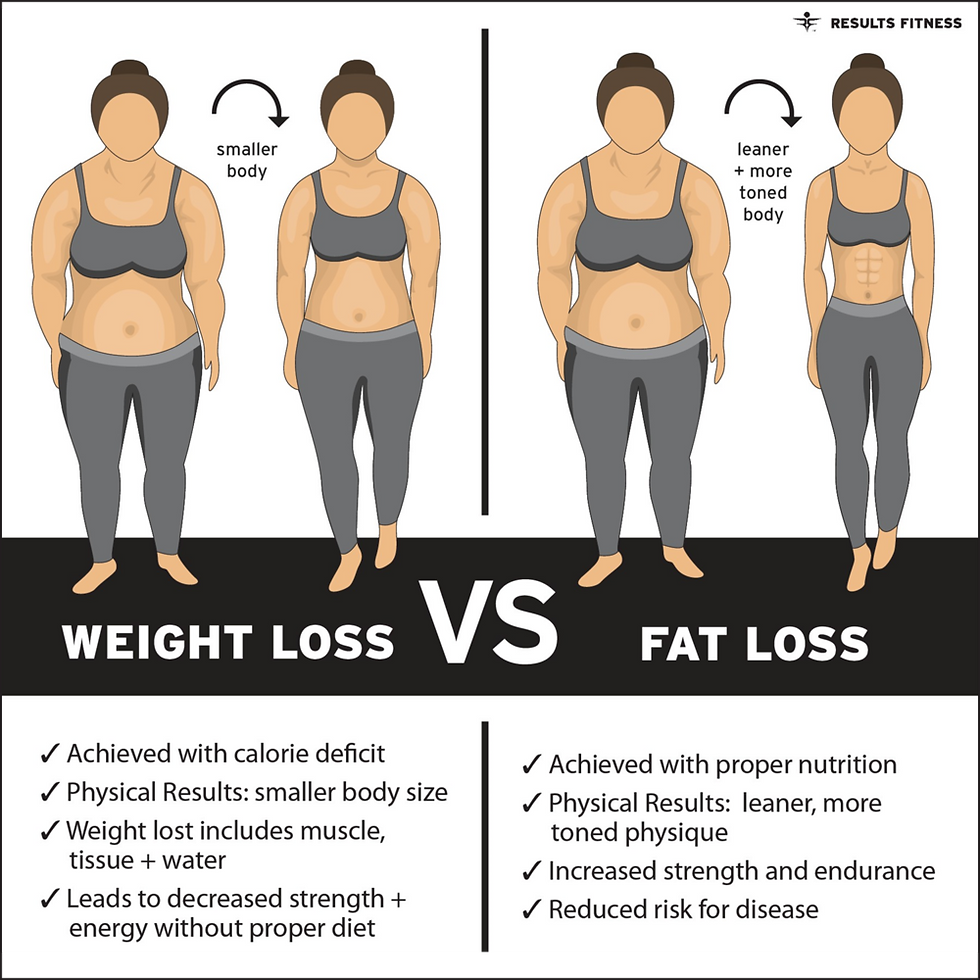
"Shedding unwanted pounds is a powerful tool to raise your levels of helpful HDL cholesterol. Some strategies to lose weight: avoid/limit processed foods, refined carbohydrates, sugar, and trans-fats, and follow my highly suggested Pan Asian Modified Mediterranean (PAMM) Diet.
"Another safe, fast, and inexpensive strategy to lose weight is to give the ketogenic diet a try. With this diet plan, you restrict your carbohydrate intake to 5-10%, proteins to 10-20%, and increase fats to 70-80%. More and more studies are showing that this diet is effective not only for weight loss but also for reducing LDL cholesterol levels and triglycerides, as well as increasing good HDL."
6. Reduce Stress

"Uncontrolled stress is an important negative contributor to health overall and that of your heart. The good news is that by managing your stress, you can help to keep your heart healthy. Some good stress management techniques include exercise, yoga, meditation, and T’ai Chi."
7. Quit Smoking

"Smoking has many devastating health consequences on your body and your heart. But did you know it also suppresses helpful HDL cholesterol levels? If you smoke, try to kick the habit."
The Bottom Line on Maintaining Your Cholesterol Levels in a Healthy Range
"The take away message here is that you want to make sure you have all the facts straight when it comes to cholesterol. Also, avoid the nonsense you’ve been led to believe about avoiding eggs and good fats from nuts, seeds, avocados, and coconut oil. And, if there is cause for concern, incorporate the lifestyle, nutritional supplement, and diet tips I outlined above to keep your cholesterol healthy."
- Sinatra, 2022
You can read the entire article here: 7 Ways to Support Healthy Cholesterol

"When it comes to heart health, cholesterol isn’t the villain. Every system and cell in your body needs cholesterol to function properly. In fact, driving your cholesterol numbers too low with statin medications can hurt your brain, immune system, metabolism, and more."
"When it comes to heart health, many people (doctors included) are still focusing on cholesterol numbers. But the truth is cholesterol is not the cause of heart disease. In fact, half of all people who die of a heart attack have normal cholesterol levels. Plus, half of all people with high cholesterol don’t have heart disease.
"I've long said cholesterol isn’t the real culprit when it comes to heart health, inflammation is. That hasn’t changed."
- Stephen Sinatra, MD
Could you please leave a comment if you found this post interesting? It would be much appreciated & would help spread the word.
The COMMENT box is at the bottom of the pages, below the REFERENCES.
REFERENCES
Amen, D. (2020). The Common Cholesterol Myth that Could Be Harming Your Brain. See: https://www.amenclinics.com/blog/the-common-cholesterol-myth-that-could-be-harming-your-brain/#:~:text=Why%20is%20cholesterol%20so%20important,increase%20the%20brain's%20processing%20speed.
Ashley, R. (2018). Ask the Doctors - Should I take CoQ10 with my statin?. UCLA Health. See: https://www.uclahealth.org/news/ask-the-doctors-not-much-scientific-evidence-to-support-use-of-coq10-for-pain#:~:text=Some%20studies%20have%20shown%20that,muscle%20aches%2C%20weakness%20or%20inflammation.
Björkhem, I. & Meany, S. (2004). Brain Cholesterol: Long Secret Life Behind a Barrier. See: https://www.ahajournals.org/doi/10.1161/01.ATV.0000120374.59826.1b
Bowden, J. & Sinatra, S. (2015). The Great Cholesterol Myth: Why Lowering Your Cholesterol Won't Prevent Heart Disease-and the Statin-Free Plan That Will. See: https://www.amazon.com/Great-Cholesterol-Myth-Disease-Statin-Free/dp/1592335217
CDC. (2023). Rabdomyolysis. See: https://www.cdc.gov/niosh/topics/rhabdo/default.html#:~:text=Rhabdomyolysis%20(often%20called%20rhabdo)%20is,permanent%20disability%20or%20even%20death.
Drugs.com (2022). What is berberine used for? See: https://www.drugs.com/medical-answers/berberine-3569378/#:~:text=Berberine%20may%20have%20side%20effects,toxic%20medicines%20such%20as%20cyclosporine.
Ferlazzo, N. et al. (2020). Neuroprotective Effect of Bergamot Juice in 6-OHDA-Induced SH-SY5Y Cell Death, an In Vitro Model of Parkinson’s Disease. Pharmaceutics: 12(4): 326. See: https://www.ncbi.nlm.nih.gov/pmc/articles/PMC7238189/
Icahn School of Medicine at Mount Sinai. (2023). Coenzyme Q10. See: https://www.mountsinai.org/health-library/supplement/coenzyme-q10#:~:text=Coenzyme%20Q10%20(CoQ10)%20is%20a,it%20is%20a%20powerful%20antioxidant
Institute for Functional Medicine. (2023). The Functional Medicine Approach. See: https://www.ifm.org/functional-medicine/what-is-functional-medicine/#:~:text=Functional%20medicine%20is%20a%20systems,contributing%20to%20an%20individual's%20illness.
Iowa State University (2009). Cholesterol-reducing Drugs May Lessen Brain Function, Says Researcher. ScienceDaily. See: https://www.sciencedaily.com/releases/2009/02/090223221430.htm#:~:text=A%20new%20study%20shows%20that,statins%20may%20lessen%20brain%20function.
Jin et al. (2019). Cholesterol Metabolism in the Brain and Its Association with Parkinson’s Disease. Experimental Neurobiology, 28(5): 554–567. See: https://www.ncbi.nlm.nih.gov/pmc/articles/PMC6844833/#:~:text=Cholesterol%20supply-,The%20brain%20contains%20the%20highest%20level%20of%20cholesterol%20in%20the,%2Fg)%20%5B35%5D
Lipman, F. (2022). 11 Life Changing Effects of Berberine. See:
Mayo Clinic Staff. (2023A). Red yeast rice. See: https://www.mayoclinic.org/drugs-supplements-red-yeast-rice/art-20363074
Mayo Clinic Staff. (2023B). Statin side effects: Weigh the benefits and risks. See: https://www.mayoclinic.org/diseases-conditions/high-blood-cholesterol/in-depth/statin-side-effects/art-20046013#:~:text=Statins%20block%20an%20enzyme%20the,they%20may%20cause%20liver%20damage.
Million Hearts. (undated). The Scoop on Statins: What Do You Need to Know? Centers for Disease Control & Prevention. See: https://millionhearts.hhs.gov/learn-prevent/scoop-on-statins.html#:~:text=Statins%20work%20by%20reducing%20the,as%20the%20heart%20and%20brain.
Pandit, A.K. et al. (2015). High-dose statin therapy and risk of intracerebral hemorrhage: a meta-analysis. John Wiley & Sons. See: https://www.drperlmutter.com/study/high-dose-statin-therapy-risk-intracerebral-hemorrhage-meta-analysis/
Perlmutter, D. (2017). Statin Drugs Increase Risk for Brain Hemorrhage. See: https://www.drperlmutter.com/statin-drugs-increase-risk-for-brain-hemorrhage/
Sinatra, S. (undated), Cholesterol—What Affects It and What Doesn’t?. See: https://www.healthydirections.com/articles/heart-health/cholesterol-and-lifestyle
Sinatra, S. (undated). The Most Important Cholesterol Ratio to Watch. See: https://www.healthydirections.com/articles/heart-health/the-most-important-cholesterol-ratio-to-watch
Sinatra, S. (undated). Citrus Bergamot for Healthy Cholesterol. See: https://www.healthydirections.com/articles/heart-health/nutrient-spotlight-citrus-bergamot-supports-healthy-cholesterol-levels
Sinatra, S. (2022). 7 Ways to Support Healthy Cholesterol. See:
Sinatra, S. (2023). What are Healthy Cholesterol Levels? See: : https://www.healthydirections.com/articles/heart-health/what-is-cholesterol-normal-levels-testing-and-treatments
WebMD. (2022). Health Benefits of Berberine. See: https://www.webmd.com/diet/berberine-health-benefits
WebMD. (2023). Red Yeast Rice - Uses, Side Effects, and More. See:
Whitaker, J. (2023). Your Top Berberine Questions Answered. See: https://www.healthydirections.com/articles/blood-sugar/top-berberine-questions?key=385817&utm_campaign=PP-1&utm_source=loy-email-all&utm_medium=email_channel&utm_content=hd-385817-ETB-4-ETS-13-PP-1-O-1-S-1_eletter_pan_082123&utm_leadgen_overlay=false&pf=0&of=HD%20website&et_s=ETS-13&et_b=ETB-4&sg=S-
(Zhiyou, C. et al. (2016). Role of berberine in Alzheimer's disease. Neuropsychiatric Disease Treatment, 12:2509-2520. See: https://www.ncbi.nlm.nih.gov/pmc/articles/PMC5055024
© Copyright 2024 Joan Rothchild Hardin. All Rights Reserved.
DISCLAIMER: Nothing on this site or blog is intended to provide medical advice, diagnosis or treatment.


Comments